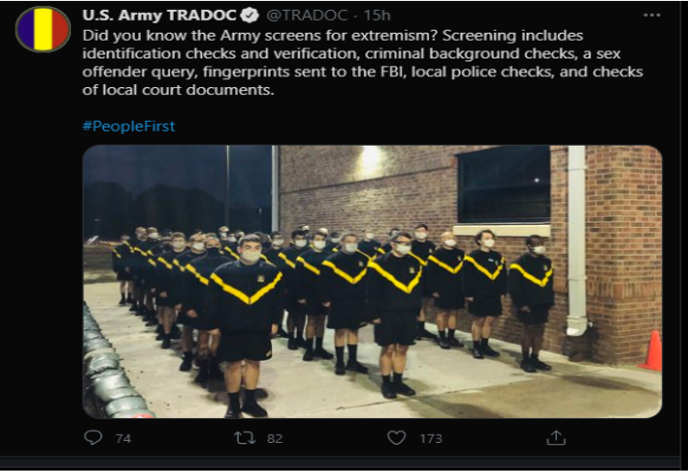The U.S. military has an extremism problem. Full stop. Anyone who denies this is uninformed. But that’s not it. That’s not the whole tweet. An inadequately short thread.
One key challenge is that the military doesn’t have a good handle on the scope or nature of the problem. It should, but it doesn’t. This leads to statements, like this one from @TRADOC, which only serve to signal a lack of understanding about the problem and potential solutions.
As @intelwire noted in his excellent book, extremists are constantly evolving in their efforts. The military must do the same. Standard screening processes may be a (small) piece of the solution puzzle, but the nature of extremism requires much more. It has to go deeper.
As @kathleen_belew noted in her incisive examination of the White power movement, DoD actions in the 1980s fell short because they failed to recognize the entrenchment of extremist networks and the need for addressing passive, not just active participation.
But what to do if the military is “stumped,” as this headline suggests? https://www.reuters.com/article/us-usa-biden-pentagon-extremism-idUSKBN2A335W
Stumped implies concentrated effort at figuring something out. That could only be true if the military, as an institution, had genuinely tried to understand and deal with the problem. The military has not done this to the level necessary to solve the problem. Yet.
There is reason for an amount of guarded optimism. @SECDEF Austin clearly understands that (1) a problem exists and (2) more work needs to be done to understand the problem in order to craft effective, lasting solutions.
His recent testimony, based on personal experience, speaks very clearly on both points: "We discovered that the signs for that activity were there all along, but we just didn't know what to look for or what to pay attention to, but we learned from that."
A comment on the “stand-down” day. I have been a part of a few. Most have fallen short. Nobody who is honest with themselves believes that a stand-down day on extremism will solve the problem. I can assure you that @SECDEF gets this.
Don’t insult his intelligence by claiming this is his solution. He understands the messaging value of a signal, but also the fact that not following up with substantive action will yield little progress. I have confidence that his action will be thoughtful and persistent.
The military is wrestling with several critical problem-sets: sexual assault, social and racial injustice, domestic violence, etc. Progress is slower than we would like. But these are not just @SECDEF’s problems to solve. Everyone single part of the community has a role to play.
I have had the privilege of working with tremendous people in the military. They care deeply about the institution and the country. Don’t accidentally paint them with the extremist brush. They are appalled at soldiers with extremist beliefs and are a key part of any solution.
Back to where we started. The military has a serious extremism problem. Addressing it will require patience, perseverance, and a healthy dose of external pressure (i.e. Congress). But, in Army speak, it’s a no-fail mission. Let’s get to it.

 Read on Twitter
Read on Twitter


